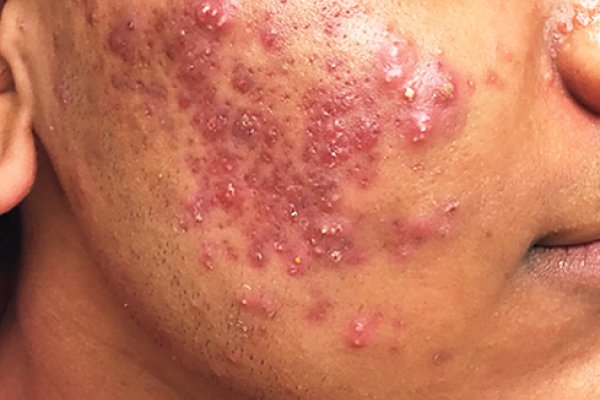ACNE VULGARIS

What is acne vulgaris?
Acne vulgaris is a common skin disease that affects 60-70% of Americans at some time during their lives. It affects the areas of skin with the densest population of sebaceous follicles (oil producing glands that are part of hair follicles); these areas include the face, the upper part of the chest, and the back. Acne vulgaris is characterized by comedomes, papules, pustules, and nodules located around these sebaceous glands. A comedone is a whitehead (closed comedone) or a blackhead (open comedone) without any signs of inflammation such as redness or tenderness. Papules and pustules are raised bumps with obvious inflammation. The face may be the only involved skin surface, but the chest, back, and upper arms are often involved.
Who is affected by acne vulgaris?
Age, sex, race and genetics play a role in risk of acne development. Genetics are a key factor: If both parents had acne, 3 of 4 children will have acne. If 1 parent had acne, then 1 of 4 of the children will have acne. However, it is important to remember that not every family will have the same pattern, with acne vulgaris sometimes skipping generations. Persons of some races are affected more than others. Acne is more common in North American races, and specific types of acne can be more common in certain races than others. Sex also plays a role: During puberty acne affects males more than females, but in adults acne affects females more than males. Lastly, different age groups are at higher risk of acne such as neonates and adolescents.
What causes acne vulgaris?
The development of acne is multi-factorial and, in addition to genetics, there are 4 leading hypotheses thought to contribute to acne:
- Follicular hyperkeratinization: This is the increased production epithelial cells (skin cells) covering the hair follicle causing it to get plugged and form a comedome. Follicular hyperkeratinization can be triggered by androgen hormones that are released by the body. These are the same hormones that are released during puberty.
- Increased sebum (oil) production by sebaceous glands further plugs up follicles. This is also triggered by hormones.
- Presence of bacteria called Propionibacterium acnes (P. acnes) within the hair follicle that cause inflammation by recruiting inflammatory cells.
- Inflammation can contribute to acne and can be the primary problem or be caused by P. Acnes.
How is acne vulgaris treated?
Patients with acne can experience significant psychological morbidity so treatment is important. There are both topical and systemic treatment options. Please see your dermatologist to see which treatment is right for you.
- Topical treatments:
- Topical retinoids (Vitamin A derivatives) can decrease inflammation and help unclog pores. Topical retinoids include adapalene, tazarotene, and tretinoin.
- Topical antibiotics help decrease the amount of P. acnes bacteria and they also serve to decrease inflammation. The most commonly prescribed antibiotic creams are erythromycin and clindamycin. Sometimes, these creams can be in a formulation with benzoyl peroxide, an agent that helps eliminate bacteria.
- Systemic treatments:
- The first line of systemic treatment is antibiotic therapy. Oral antibiotics help decrease inflammation and P. acnes bacteria. The most commonly used antibiotics are those in the tetracycline family, such as minocycline, doxycycline and tetracycline. Over time P. acnes bacteria can build resistance to these medications, decreasing their effectiveness.
- Hormonal treatments such as spirinolactone or oral contraceptives help decrease the amount of testosterone circulating in the body. High levels of testosterone and androgens (sex hormones) contribute to acne development.
- Oral retinoic acid derivatives, such as isotretinoin, are highly effective in the treatment of severe, recalcitrant acne vulgaris. Isotretinoin decreases follicular hyperkeratinization, depresses sebum secretion, is anti-inflammatory, and even reduces the presence of P. acnes. Isotretinoin is effective because it attacks acne from all fronts, however it can have many side effects (see Accutane).
REFERENCES


